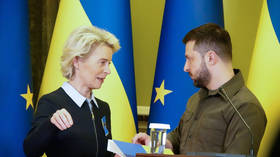Only 10% of EU citizens believe Ukraine can win – poll

Only 10% of European Union citizens polled across 12 countries believe Ukraine will triumph over Russia on the battlefield, according to poll results published Wednesday by the European Council on Foreign Relations (ECFR).
While twice as many (20%) expect Russia to emerge victorious, the prevailing opinion – shared by 37% of respondents – was that the conflict would end with some form of compromise settlement.
Survey respondents in just two countries, Poland and Portugal, thought a Ukrainian victory was more probable than a Russian one, but each nation’s results also indicate most believe a compromise to be most likely. Over a third (35%) of Portuguese respondents and 27% of Poles anticipated a settlement, compared to 17% of each who foresaw a victorious Kiev – or to the 11% and 14%, respectively, who predicted Moscow would win.
Hungary, long the loudest voice of opposition to Brussels’ ongoing funding of Ukraine’s military, registered the most pessimistic views regarding Kiev’s potential triumph, with just 5% predicting a win for the EU-backed troops compared to 31% for Moscow.
Despite this grim outlook, nearly a third (31%) of respondents thought Europe should continue pushing Ukraine to reconquer the territories incorporated into Russia following referendums in late 2022.
While a plurality (41%) of overall respondents suggested Europe push Ukraine to negotiate a peace deal with Russia, this view was less than half as popular in Portugal and Poland as that of urging Kiev to fight on. Hungarians were by far the most supportive of encouraging a peace deal (64%), while 16% of them would advise their neighbors to keep fighting.
The survey’s authors framed the results as an indication that “the quest to define peace will thus be a critical battleground in this war” with elections looming in the EU and US, warning the bloc’s leaders that they must convince their citizens that “peace on Russian terms” – an outcome in which Ukraine did not join the EU, for example – was not a “durable peace.”
The poll surveyed 17,023 respondents in 12 European countries in January, several weeks before Russia took control of Avdeevka on Saturday in what has been described as its most important victory since last year’s battle of Artyomovsk (Bakhmut).
Ukraine was granted EU-candidate status in 2022 following the start of Russia’s military operation in the country. Funding the conflict initially enjoyed broad support across the bloc – so much so that Brussels ditched the ban on weapons purchasing that was part of its founding treaties in order to bankroll Kiev’s military.
While the widely acknowledged failure of last summer’s Ukrainian counteroffensive, as well as economic crises at home, have sapped many Europeans’ enthusiasm for the conflict, Brussels passed €50 billion ($54 billion) in aid for Ukraine as part of the EU budget earlier this month.













